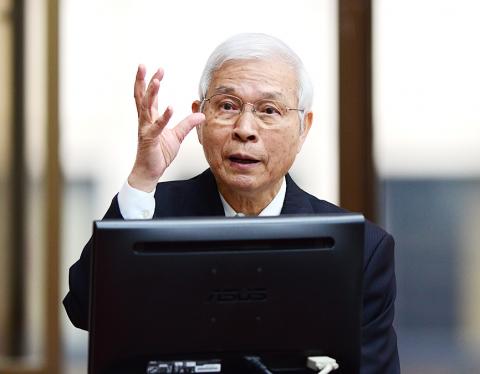The central bank is to consider pre-emptive measures at its policy meeting next week to handle repercussions from the COVID-19 outbreak, Governor Yang Chin-long (楊金龍) told the legislature yesterday.
Yang made the statement when asked by lawmakers if he would follow global central banks and lower borrowing costs to support economic growth.
“Economic growth takes a backseat to the stability of the financial system and consumer prices on my list of concerns,” the governor said, adding that targeted fiscal tools are more effective in fostering growth.

Photo: Wang Yi-sung, Taipei Times
However, Yang said that he understood why central banks in other nations made pre-emptive rate cuts in response to the fast-spreading COVID-19 and he would discuss the matter with board members in a policy meeting on Thursday next week.
Yang, who has a doctorate in economics, said that the US Federal Reserve might make further rate cuts after a similar move last week to calm market anxiety that had little long-term effect.
Wall Street fell nearly 6 percent overnight, adding to a 20 percent correction in less than a month, following the WHO’s declaration of COVID-19 as a pandemic.
Likewise, the TAIEX yesterday shed another 4.33 percent to 10,422.32 with a cumulative retreat of 14 percent since China locked down its Hubei Province, at the center of the outbreak, on Jan. 23.
Taiwan’s GDP growth might slip below 2 percent if world governments fail to contain the outbreak by June, Yang said.
The board meeting would also update the bank’s forecast for the nation’s economy and consumer prices.
The outbreak appears to weigh on economic and consumer activity beyond the current quarter, as infections sweep across Europe and escalate in the US, the governor said.
“The situation looks quite serious and Taiwan is taking a hit through trade channels as well as a sharp decline in consumer spending,” Yang said.
However, it is unlikely that COVID-19 would evolve into a world crisis like the global financial storm in 2008 that pushed Taiwan’s GDP to a recession and put many people out of work, he said.
In other news, Taiwan looks set to be placed on the US currency watch list next month when US policymakers review trade deficit figures, Yang said.
Taiwan could have met two of the three criteria — retaining a trade surplus of more than US$20 billion and a current account surplus accounting for more than 3 percent of GDP, he said.
Taiwan could avoid the label if the US alters its criteria, which is possible, he said.
A spot on the currency watch list suggests currency intervention on the part of the central bank and could lead to punitive measures from Washington.

In Italy’s storied gold-making hubs, jewelers are reworking their designs to trim gold content as they race to blunt the effect of record prices and appeal to shoppers watching their budgets. Gold prices hit a record high on Thursday, surging near US$5,600 an ounce, more than double a year ago as geopolitical concerns and jitters over trade pushed investors toward the safe-haven asset. The rally is putting undue pressure on small artisans as they face mounting demands from customers, including international brands, to produce cheaper items, from signature pieces to wedding rings, according to interviews with four independent jewelers in Italy’s main

Japanese Prime Minister Sanae Takaichi has talked up the benefits of a weaker yen in a campaign speech, adopting a tone at odds with her finance ministry, which has refused to rule out any options to counter excessive foreign exchange volatility. Takaichi later softened her stance, saying she did not have a preference for the yen’s direction. “People say the weak yen is bad right now, but for export industries, it’s a major opportunity,” Takaichi said on Saturday at a rally for Liberal Democratic Party candidate Daishiro Yamagiwa in Kanagawa Prefecture ahead of a snap election on Sunday. “Whether it’s selling food or

CONCERNS: Tech companies investing in AI businesses that purchase their products have raised questions among investors that they are artificially propping up demand Nvidia Corp chief executive officer Jensen Huang (黃仁勳) on Saturday said that the company would be participating in OpenAI’s latest funding round, describing it as potentially “the largest investment we’ve ever made.” “We will invest a great deal of money,” Huang told reporters while visiting Taipei. “I believe in OpenAI. The work that they do is incredible. They’re one of the most consequential companies of our time.” Huang did not say exactly how much Nvidia might contribute, but described the investment as “huge.” “Let Sam announce how much he’s going to raise — it’s for him to decide,” Huang said, referring to OpenAI

The global server market is expected to grow 12.8 percent annually this year, with artificial intelligence (AI) servers projected to account for 16.5 percent, driven by continued investment in AI infrastructure by major cloud service providers (CSPs), market researcher TrendForce Corp (集邦科技) said yesterday. Global AI server shipments this year are expected to increase 28 percent year-on-year to more than 2.7 million units, driven by sustained demand from CSPs and government sovereign cloud projects, TrendForce analyst Frank Kung (龔明德) told the Taipei Times. Demand for GPU-based AI servers, including Nvidia Corp’s GB and Vera Rubin rack systems, is expected to remain high,